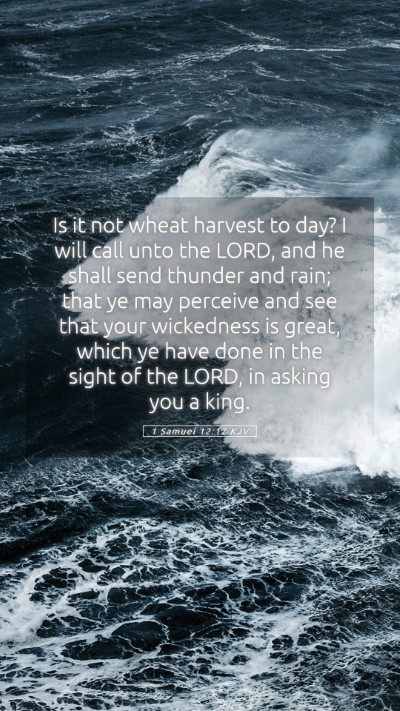Bible Verse Meaning: 1 Samuel 12:17
Verse: "Is it not wheat harvest today? I will call unto the Lord, and he shall send thunder and rain; that ye may perceive and see that your wickedness is great, which ye have done in the sight of the Lord, in asking you a king." (1 Samuel 12:17)
Summary of Insights from Public Domain Commentaries
This verse comes from a pivotal moment in the Old Testament where Samuel is addressing the people of Israel. They had requested a king to rule over them, despite God being their sovereign leader. Samuel serves as a prophet and judge, conveying God's message to the people and warning them of the consequences of their choice.
Understanding the Context
In this passage, Samuel emphasizes the gravity of Israel's request for a king. It occurs during the wheat harvest, a time of prosperity. By calling upon the Lord to send thunder and rain, Samuel aims to demonstrate God's power and instill a sense of fear and reverence among the people.
Bible Verse Interpretations by Commentators
- Matthew Henry: He notes that the request for a king was an act of rebellion against God’s authority. Samuel’s invocation of a natural display (thunder and rain) serves to remind them of God's control over creation and their need for Him.
- Albert Barnes: Barnes elaborates on the significance of the wheat harvest, pointing out that it demonstrates God's provision. The timing of Samuel's prophecy highlights the irony of seeking a human king when God has already blessed them abundantly.
- Adam Clarke: Clarke emphasizes the "great wickedness" of Israel’s demand, suggesting it reflects a deep-seated desire to abandon divine leadership in favor of earthly governance. He points out that this act not only undermines God’s authority but also sets a precedent for disobedience.
Theological Implications
This verse calls for a deep engagement with themes such as:
- Human Authority vs. Divine Authority: It raises essential questions about the rightful governance authority in believers' lives.
- Consequences of Rebellion: The consequences outlined by Samuel serve as a warning sign for those who choose to turn away from God.
- God’s Sovereignty: The supernatural signs illustrate that God remains in control, no matter the earthly situations.
Applying the Verse Today
In modern application, this scripture encourages Christians to evaluate their reliance on human systems versus divine guidance. It invites a reflection on current leaders and systems in light of God’s counsel and provision.
Bible Study Insights
Engaging with 1 Samuel 12:17 can enrich your understanding of biblical governance and the nature of God’s authority. Here are some suggested topics for further Bible study:
- Bible Study Groups: Discuss the implications of seeking human authority over God’s leadership.
- Online Bible Study: Explore resources that focus on Old Testament kings and their impact on Israel's faithfulness.
- Bible Study Resources: Use commentaries to gain deeper insights into Samuel’s life and role as a prophet.
Cross References
Related scriptures that provide additional context include:
- 1 Samuel 8:7 - The request for a king
- 1 Samuel 10:19 - The people’s rejection of God
- 1 Samuel 15:23 - The consequences of disobedience
Conclusion
1 Samuel 12:17 serves as a critical reflection on human leadership, divine authority, and the repercussions of turning away from God. Understanding such verses through detailed study and commentary can lead to a more profound knowledge of Scripture and its applications in our lives today. Whether you are part of a Bible study group or engaging in personal study, the insights gained from this verse can guide you in navigating faith amidst worldly challenges.


